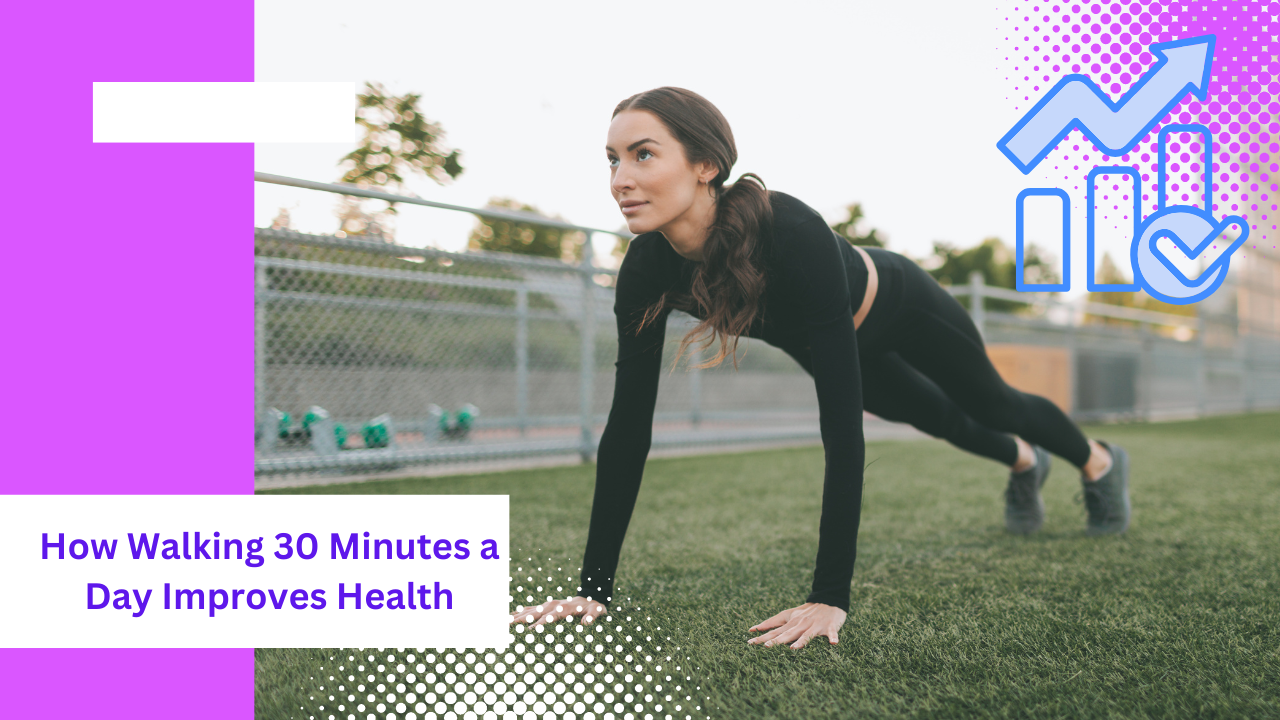Introduction
Imagine that you can revolutionize your health in only 30 minutes a day. Walking is the easiest and most powerful tool to enhance overall well-being. Unlike high-impact exercises, walking is easy on the joints, doesn’t need any special equipment, and can be done anywhere. Whether you want to lose weight, tone your heart, or lift your mood, a daily 30-minute walk can be of immense advantage.
In this article, we’re going to explore the many ways walking benefits physical and mental health, averts diseases, and enhances quality of life. We’ll also offer practical advice to make walking an everyday activity and reap the greatest rewards.
Why Walking is One of the Best Forms of Exercise

Walking is a low-impact, easy exercise that can be done by anyone at any age and fitness level. It does not need a gym membership, costly equipment, or a formal workout routine. Following are some reasons why walking is one of the best exercises:
- Easy to Start – You can walk anywhere: parks, sidewalks, or even indoors.
- Low Injury Risk – As compared to running or vigorous exercise, walking minimizes stress on the joints.
- Scientifically Validated Benefits – Evidence demonstrates walking benefits cardiovascular health, mental health, and lifespan.
As reported in a Harvard School of Public Health study, individuals who exercise regularly by walking have a 30% reduced risk of cardiovascular disease compared to individuals who are sedentary.
Physical Health Gains of Walking 30 Minutes Daily

1. Enhances Cardiovascular Well-being
A 30-minute walk can make the heart stronger and reduce the risk of heart disease. Walking enhances circulation, lowers bad cholesterol (LDL), and raises good cholesterol (HDL). It also stabilizes blood pressure.
Supporting Data:
- According to a study that appeared in the American Journal of Preventive Medicine, brisk walking for 30 minutes every day reduces stroke risk by 20%.
2. Assists with Weight Loss and Fat Burning
People believe that losing weight requires them to perform hard exercises, but walking may work just as well. Walking not only burns calories, raises the metabolism rate, and keeps muscles intact during the burning of fat.
Calories Burned by Walking (Per 30 Minutes):
| Walking Speed | Calories Burned (150 lb person) |
|---|---|
| Slow (2 mph) | 102 calories |
| Moderate (3 mph) | 143 calories |
| Brisk (4 mph) | 180 calories |
3. Strengthens Muscles and Bones
Daily walking is essential to prevent osteoporosis and maintain bone density. Walking also makes the leg muscles strong, enhancing stability and lowering the risk of falls, particularly among older people.
4. Enhances Digestive Health
If you experience bloating or slow digestion, a walk each day will help normalize bowel movements and prevent constipation. Walking triggers contractions in the intestines, which helps digest food.
Psychological and Emotional Benefits of Walking
1. Lessens Stress and Anxiety
Walking is a good stress reducer. It reduces levels of the stress hormone cortisol while elevating production of endorphins, the “feel-good” hormones.
“Walking is the best possible exercise. Habituate yourself to walk very far.”
– Thomas Jefferson
2. Improves Brain Function and Memory
Research indicates that walking improves cognitive ability, lowers the risk of dementia, and enhances memory. It boosts blood flow to the brain, providing vital oxygen and nutrients.
3. Boosts Creativity and Concentration
Having trouble with brain fog? A quick walk can stimulate creativity and concentration. Many of history’s greatest thinkers, such as Steve Jobs, Albert Einstein, and Charles Dickens, were famous for taking long walks to generate ideas.
Walking and Disease Prevention
1. Lowers Risk of Chronic Diseases
Regular walking helps prevent lifestyle-related diseases such as:
✅ Type 2 diabetes – Regulates blood sugar levels.
✅ Hypertension – Lowers blood pressure.
✅ Stroke – Reduces risk by 20-30%.
2. Supports Immune System Health
Walking increases the production of white blood cells, which fight infections. A study published in the British Journal of Sports Medicine discovered that individuals who walk regularly have 43% fewer sick days compared to those who don’t.
3. Enhances Sleep Quality
Struggling to sleep? Walking regulates the body’s internal clock, enabling one to sleep better and sleep longer.
Walking as a Daily Habit
1. Establish a Schedule and Goals
- Walk at the same time every day (morning, lunch hour, or night).
- Begin at 10 minutes and build up to 30 minutes.
2. Utilize Technology to Remain Motivated
- Monitor steps with fitness tracking apps such as Google Fit, Apple Health, or Fitbit.
- Join a step challenge with friends for accountability.
3. Make Walking Enjoyable
- Listen to podcasts, audiobooks, or music.
- Explore new routes or nature trails.
- Walk with a friend, family member, or pet.
Walking Techniques for Maximum Health Benefits
1. Maintain Proper Posture and Breathing
- Maintain head up, shoulders relaxed, and back straight.
- Breathe deeply to maximize oxygen intake.
2. Mix Speed and Incline for More Effective Results
- Attempt interval walking: Alternate between walking slowly and quickly.
- Walk on inclined surfaces or stairs to step up intensity.
3. Add Strength Moves
- Incorporate lunges, squats, or arm swings during walking to activate more muscles.
Success Stories of Individuals Who Changed Their Health with Walking
1. How a 50-Year-Old Turned Back Prediabetes
Sarah, an office employee at age 50, had prediabetes. Through being diligent about a 30-minute daily walk, she lost 20 lbs, normalized her blood sugar, and didn’t need medication anymore.
2. A Busy Businessperson Lost 30 lbs Walking
Mark is a 38-year-old businessman who found exercising difficult. He began walking 30 minutes daily in the morning, lost 30 lbs within six months, and now has greater energy for work and family.
Common Myths About Walking
1. “Walking Isn’t Effective for Weight Loss”
✅ Reality: Walking burns calories, increases metabolism, and helps in creating a calorie deficit required for weight loss.
2. “You Need Intense Workouts to See Results”
✅ Reality: Walking has been proven to enhance heart health, mental health, and overall fitness. Consistency is the key!
Conclusion: Take the First Step Today
Simply taking a 30-minute walk a day can drastically increase your well-being, from fortifying your heart to energizing your mood. And the great news? It’s free, convenient, and for anyone.
Practical Steps to Implement Today:
✔️ Put in place a reminder on a daily basis to take a walk.
✔️ Begin with short 10-minute walks and increase slowly.
✔️ Monitor improvement through a fitness app.
✔️ Ask a friend or pet to walk with you.
Don’t wait—take the first step today and discover the amazing advantages of walking! ????♂️????
Recommended Royalty-Free Images & Infographics:
- Pexels (pexels.com)
- Unsplash (unsplash.com)
- Pixabay (pixabay.com)
Would you like me to edit or include anything in particular? ????
Readmore…https://totalinsights.online/wp-admin/post.php?post=28788&action=edit

